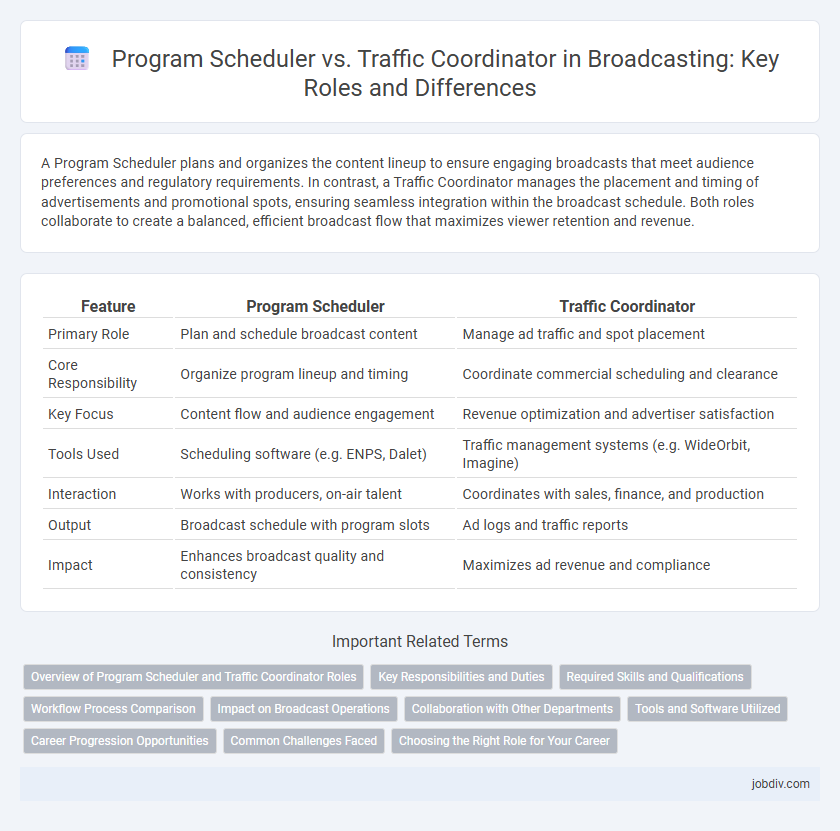A Program Scheduler plans and organizes the content lineup to ensure engaging broadcasts that meet audience preferences and regulatory requirements. In contrast, a Traffic Coordinator manages the placement and timing of advertisements and promotional spots, ensuring seamless integration within the broadcast schedule. Both roles collaborate to create a balanced, efficient broadcast flow that maximizes viewer retention and revenue.
Table of Comparison
| Feature | Program Scheduler | Traffic Coordinator |
|---|---|---|
| Primary Role | Plan and schedule broadcast content | Manage ad traffic and spot placement |
| Core Responsibility | Organize program lineup and timing | Coordinate commercial scheduling and clearance |
| Key Focus | Content flow and audience engagement | Revenue optimization and advertiser satisfaction |
| Tools Used | Scheduling software (e.g. ENPS, Dalet) | Traffic management systems (e.g. WideOrbit, Imagine) |
| Interaction | Works with producers, on-air talent | Coordinates with sales, finance, and production |
| Output | Broadcast schedule with program slots | Ad logs and traffic reports |
| Impact | Enhances broadcast quality and consistency | Maximizes ad revenue and compliance |
Overview of Program Scheduler and Traffic Coordinator Roles
Program Schedulers design and organize broadcast content to maximize audience engagement and ensure seamless transitions between shows. Traffic Coordinators manage the allocation, timing, and placement of commercials and promos within the broadcast schedule, ensuring compliance with advertising contracts and regulatory requirements. Both roles collaborate to optimize broadcast flow and revenue generation in television and radio stations.
Key Responsibilities and Duties
The Program Scheduler is responsible for creating and managing the broadcast schedule to ensure optimal content flow, coordinating with production teams to align programming with target audience preferences and time slots. The Traffic Coordinator oversees the placement of commercials, promos, and sponsored content within the schedule, ensuring compliance with advertising contracts and accurate logging for billing purposes. Both roles require close collaboration to balance programming goals with revenue generation, maintaining seamless broadcast operations.
Required Skills and Qualifications
Program Schedulers require strong analytical skills, familiarity with broadcast software, and a deep understanding of audience demographics to effectively plan programming schedules. Traffic Coordinators need excellent organizational abilities, attention to detail, and proficiency in managing commercial inventory and ensuring accurate ad placement compliance. Both roles demand solid communication skills and knowledge of FCC regulations to maintain smooth broadcast operations.
Workflow Process Comparison
Program Schedulers prioritize content planning by organizing show lineups and ensuring seamless transitions that maximize viewer engagement. Traffic Coordinators manage the distribution of advertisements and promotional material, coordinating with sales teams to align commercial delivery accurately within the broadcast timeline. Both roles integrate closely but differ in workflow focus--Program Schedulers emphasize programming flow, while Traffic Coordinators concentrate on ad inventory and compliance, ensuring optimal revenue capture.
Impact on Broadcast Operations
Program Schedulers optimize broadcast content flow by strategically planning show timings and placements to maximize viewer engagement and advertising revenue. Traffic Coordinators ensure the accurate insertion of commercials and compliance with contractual obligations, directly impacting the seamless execution of the broadcast schedule. Effective collaboration between Program Schedulers and Traffic Coordinators enhances operational efficiency, reduces airtime errors, and maximizes overall broadcast profitability.
Collaboration with Other Departments
Program schedulers collaborate closely with marketing and production teams to align content timing and promotional activities, ensuring seamless viewer engagement. Traffic coordinators work hand-in-hand with sales and advertising departments to coordinate commercial placements and spot availabilities, maximizing revenue opportunities. Effective collaboration between these roles facilitates smooth broadcast operations and optimizes scheduling efficiency.
Tools and Software Utilized
Program Schedulers primarily utilize broadcast management systems like WideOrbit and ENCO DAD for automating content playlists and scheduling advertisements based on ratings and audience metrics. Traffic Coordinators rely on traffic software such as MusicMaster and Telestream switchers to manage ad insertions, confirm spot placements, and coordinate live commercial breaks with precision. Integration of these tools ensures seamless workflow between scheduling content and executing ad traffic, optimizing overall broadcast operations.
Career Progression Opportunities
Program Schedulers primarily focus on creating and organizing broadcast content schedules, developing skills in content management and audience analysis that lead to roles in programming management or content strategy. Traffic Coordinators manage the distribution and timing of advertisements and promotions, gaining expertise in ad operations and compliance, which can advance to positions like traffic manager or broadcast operations director. Career progression for both roles involves gaining cross-functional experience in programming and sales coordination, enhancing opportunities in senior broadcast management.
Common Challenges Faced
Program schedulers and traffic coordinators in broadcasting often face challenges such as managing tight deadlines, coordinating multiple content sources, and ensuring compliance with regulatory requirements. Both roles must handle last-minute changes and disruptions, which require agile decision-making and effective communication across departments. Balancing audience preferences with advertiser demands while maintaining seamless broadcast flow remains a persistent difficulty.
Choosing the Right Role for Your Career
A Program Scheduler focuses on planning and organizing broadcast content, ensuring that shows air at optimal times to maximize audience engagement and advertising revenue. A Traffic Coordinator manages the flow of commercial spots and content delivery, coordinating with sales and production teams to ensure schedules are met without conflicts. Choosing between these roles depends on your strengths in strategic content planning versus logistical coordination and communication within broadcasting operations.
Program Scheduler vs Traffic Coordinator Infographic

 jobdiv.com
jobdiv.com